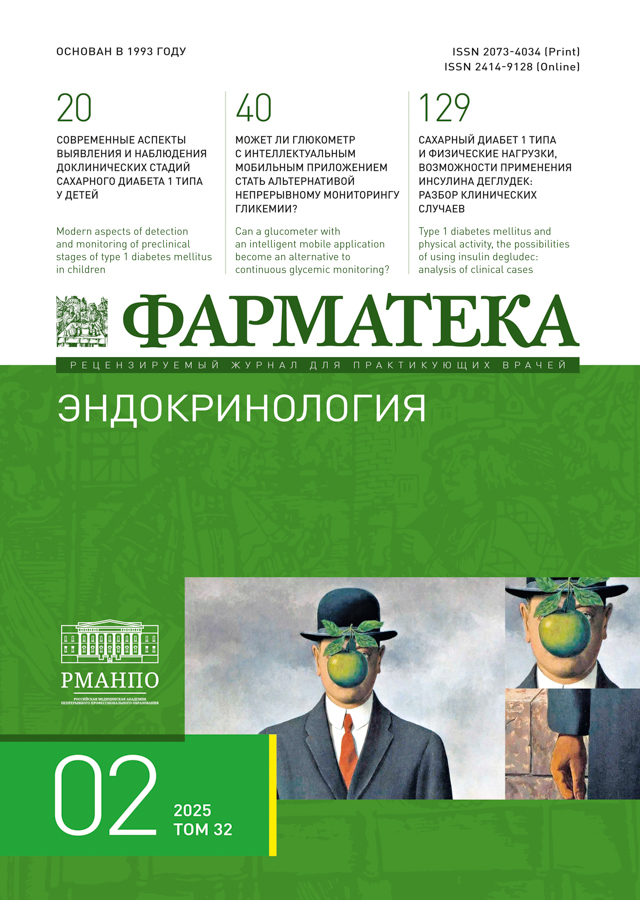Может ли глюкометр с интеллектуальным мобильным приложением стать альтернативой непрерывному мониторингу гликемии?
- Авторы: Котешкова О.М.1, Анциферова Д.М.1,2, Анциферов М.Б.1,2
-
Учреждения:
- Эндокринологический диспансер ДЗМ
- Российская медицинская академия непрерывного профессионального образования
- Выпуск: Том 32, № 2 (2025)
- Страницы: 40-46
- Раздел: Клинический опыт
- URL: https://journals.eco-vector.com/2073-4034/article/view/679862
- DOI: https://doi.org/10.18565/pharmateca.2025.2.40-46
- ID: 679862
Цитировать
Полный текст
Аннотация
Цель работы: обосновать использование интеллектуальных мобильных приложений к глюкометрам для более эффективного дистанционного управления сахарным диабетом (СД) как реальной альтернативы непрерывному мониторингу гликемии (НМГ) для пациентов с СД.
Основные положения. Достижение адекватного контроля СД невозможно без проведения пациентом самоконтроля. Регулярно обновляются рекомендации по ведению больных с СД, разрабатываются более современные подходы к самоконтролю гликемии, внедряются инновационные глюкометры, представляющие собой системы с мобильным приложением. Все шире используются системы НМГ. Применение технологий НМГ и ФМГ позволяют проводить контроль гликемии в реальном времени. Метаанализы исследований по оценке эффективности этих технологий показывают преимущества по увеличению процента времени нахождения гликемии в целевом диапазоне и снижению периодов гипогликемий, а применение дневника питания в виде приложения способствует более эффективному снижению массы тела. Применение современных мобильных приложений к глюкометру или НМГ позволяют повысить мотивацию пациентов и расширить возможности по управлению заболеванием.
Полный текст
Об авторах
Ольга Михайловна Котешкова
Эндокринологический диспансер ДЗМ
Автор, ответственный за переписку.
Email: koala58@mail.ru
ORCID iD: 0000-0001-8428-4116
SPIN-код: 6141-1224
к.м.н., зав. отделением обучения и лечения диабета
Россия, МоскваДарья Михайловна Анциферова
Эндокринологический диспансер ДЗМ; Российская медицинская академия непрерывного профессионального образования
Email: cifrenda@yandex.ru
ORCID iD: 0000-0002-3920-5914
аспирант кафедры эндокринологии, врач-эндокринолог
Россия, Москва; МоскваМихаил Борисович Анциферов
Эндокринологический диспансер ДЗМ; Российская медицинская академия непрерывного профессионального образования
Email: antsiferov@rambler.ru
ORCID iD: 0000-0002-9944-2997
SPIN-код: 1035-4773
д.м.н., профессор, президент
Россия, Москва; МоскваСписок литературы
- URL: www. diabetesatlas.org. Facts & figures (idf.org) https://www.idf.org/aboutdiabetes/what-is-diabetes/facts-figures.html.
- The Diabetes Control and Complications Trial Research Group. The effect of intensive treatment of diabetes on the development and progression of long-term complications in insulin-dependent diabetes mellitus. N Engl J Med. 1993;329:977–986. doi: 10.1056/NEJM199309303291401.
- UK Prospective Diabetes Study (UKPDS) Group. Intensive blood-glucose control with sulphonylureas or insulin compared with conventional treatment and risk of complications in patients with type 2 diabetes (UKPDS 33). Lancet. 1998;352:837–853. doi: 10.1016/S0140-6736(98)07019-6.
- Дедов И.И., Шестакова М.В., Майоров А.Ю. Алгоритмы специализированной медицинской помощи больным сахарным диабетом. 11-е изд. М., 2023. doi: 10.14341/DM13042. [Dedov I.I., Shestakova M.V., Mayorov A.Yu. Algorithms of specialized medical care for patients with diabetes mellitus. 11th ed. M., 2023. (In Russ.)]. doi: 10.14341/DM13042.
- Nathan D.M., Cleary P.A., Backlund J.-Y.C., et al. Intensive diabetes treatment and cardiovascular disease in patients with type 1 diabetes. N Engl J Med. 2005;353:2643–2653. doi: 10.1056/NEJMoa052187
- ADVANCE Collaborative Group, Patel A., MacMahon S., et al. Intensive blood glucose control and vascular outcomes in patients with type 2 diabetes. N Engl J Med. 2008;358:2560–2572. doi: 10.1056/NEJMoa0802987.
- Duckworth W., Abraira C., Moritz T., et al. Glucose control and vascular complications in veterans with type 2 diabetes. N Engl J Med. 2009;360:129–139. doi: 10.1056/NEJMoa0808431
- ACCORD Study Group, Gerstein H.C., Miller M.E., et al. Long-term effects of intensive glucose lowering on cardiovascular outcomes. N Engl J Med. 2011;364:818–828. doi: 10.1056/NEJMoa1006524.
- Akturk H.K., Dowd R., Shankar K., et al. Real-world evidence and glycemic improvement using Dexcom G6 features. Diabetes Technol Ther. 2021;23:21–26. doi: 10.1089/Dia.2020.0654.
- Gomez-Peralta F., Dunn T., Landuyt K. et al. Flash glucose monitoring reduces glycemic variability and hypoglycemia: real-world data from Spain. BMJ Open Diabetes Res Care. 2020;8(1):e001052. doi: 10.1136/bmjdrc-2019-001052.
- Willis H.J., Asche S.E., McKenzie A.L. et al. Impact of continuous glucose monitoring versus blood glucose monitoring to support a carbohydrate-restricted nutrition intervention in people with type 2 diabetes. Diabetes Technol Ther. 2024 Nov 11. doi: 10.1089/dia.2024.0406.
- Martens T.W., Willis H.J., Bergenstal R.M., et al. A randomized controlled trial using continuous glucose monitoring to guide food choices and diabetes self-care in people with type 2 diabetes not taking insulin. Diabetes Technol Ther. 2025;27:261–270. doi: 10.1089/dia.2024.0579.
- Martens T., Beck R.W., Bailey R,, et al. Effect of continuous glucose monitoring on glycemic control in patients with type 2 diabetes treated with basal insulin. A randomized clinical trial. JAMA 2021;325:2262–2272. doi: 10.1001/jama.2021.7444.
- Fisher L., Fortmann A., Stuhr A. Can a basic management app paired with a glucose meter help reduce glucose levels among adults with type 2 diabetes? The REALL Study. J Diabetes Sci Technol. 2024;18(1):99–105. doi: 10.1177/19322968221096163.
- Steinhubl S.R., Muse E.D, Topol E.J. Can mobile health technologies transform health care? JAMA. 2013;310(22):2395–2396. doi: 10.1001/jama.2013.281078.
- Hansen A.H., Wangberg S.C., Arsand E. Lifestyle changes among people with type 2 diabetes are associated with participation in online groups and time since diagnosis. BMC Health Serv Res. 2021;21(1):688. doi: 10.1186/s12913-021-06660-5.
- Wu I.X.Y., Kee J.C.Y., Threapleton D.E., et al. Effectiveness of smartphone technologies on glycaemic control in patients with type 2 diabetes: systematic review with meta-analysis of 17 trials. Obes Rev. 2018;9(6):825–38. doi: 10.1111/obr.12669.
- Tchero H., Kangambega P., Briatte C., et al. Clinical effectiveness of telemedicine in diabetes mellitus: a meta-analysis of 42 randomized controlled trials. Telemed J E Health. 2019;25(7):569–583. doi: 10.1089/tmj.2018.0128.
- Haider R., Sudini L., Chow C.K., Cheung N.W. Mobile phone text messaging in improving glycaemic control for patients with type 2 diabetes mellitus: a systematic review and meta-analysis. Diabetes Res Clin Pract. 2019;150:27–37. doi: 10.1016/j.diabres.2019.02.022.
- Middleton T., Constantino M., McGill M., et al. An enhanced SMS text message-based support and reminder program for young adults with type 2 diabetes (TEXT2U): randomized controlled trial. J Med Internet Res. 2021;23(10):e27263. doi: 10.2196/27263.











